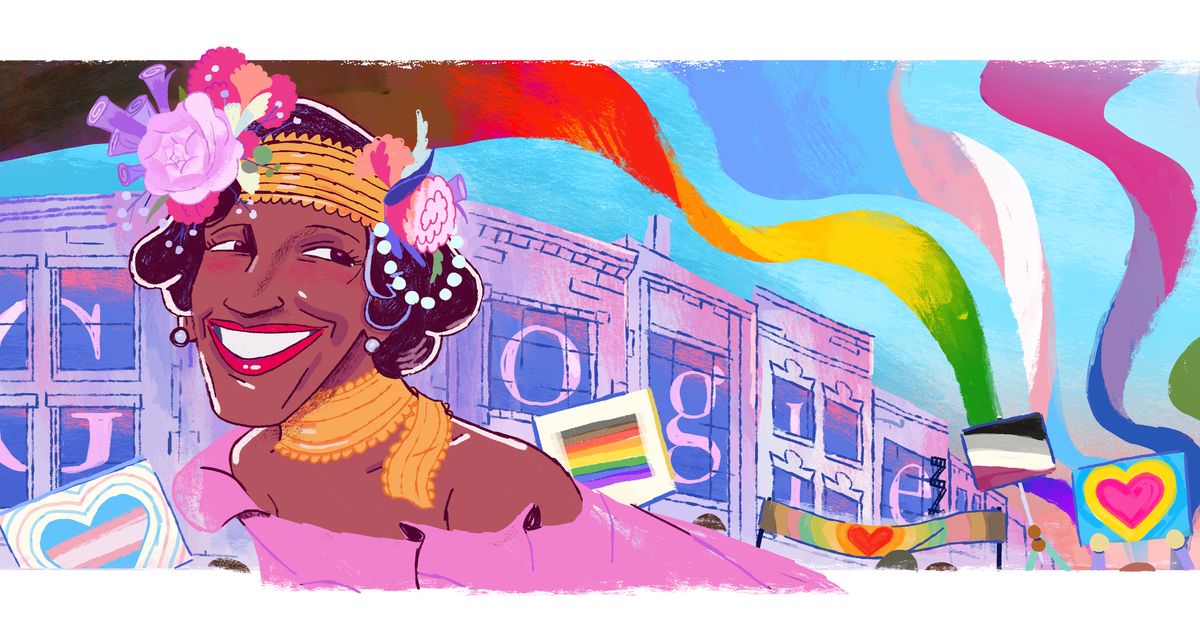
As a tumultuous Pride Month draws to a close, Google is marking it with a tribute to transgender artist, activist, and drag performer Marsha P. Johnson.
Johnson was a central and beloved figure in New York’s gay scene from the 1960s onward, and is widely recognized as one of the first people to fight back against police harassing patrons during a raid on the Stonewall Hotel. This sparked the Stonewall riots, commemorations of which became Pride celebrations.
Alongside Sylvia Rivera, Johnson also founded Street Transvestite (now Transgender) Activist Revolutionaries, or STAR, to offer housing, food, and other assistance to trans and non-binary youth. She said the “P” in her name was there for when people questioned her gender or presentation — it stood for “Pay it no mind.”
Johnson died in 1992, in what was officially ruled a suicide but believed by her loved ones to be a murder.
The bright illustration, created by L.A. artist Rob Gilliam, features ribbons of color (including the trans, bisexual, and genderqueer flag stripes, and a rainbow topped with black and brown) emanating from a march led by Johnson’s iconic smile.
“As a queer person of color I owe Marsha so much,” Gilliam said in a press release. “She was the catalyst for our liberation, the driving force behind the movement that has given many of us the rights and freedoms that we previously couldn’t even dream of. Marsha created a space for us in western society through her empowering bravery and refusal to be silenced.”
Elle Hearns, founder and executive director of the Marsha P. Johnson Institute, envisions Tuesday’s doodle as a pathway for more people to discover Johnson’s legacy amidst the reckoning happening in American public life.
“This moment is a testament to our movement, and the amount of time and sacrifices Black trans people have made to contribute to something bigger than all of us,” said Hearns in a statement. “I hope the collaboration between The MPJI and Google.org will serve as an opportunity for the world to interrupt its own fixation on transphobia and fear of redistributing wealth to communities that need it most. This is life-long work. Black trans women have always been here and will continue to be.”
“Marsha knew that the true key to liberation was intersectionality,” said Gilliam. “The original Pride movement pulled in participants from across the lines of class and race and sexuality and gender expression and united an entire community. Recent times have been extremely divisive, and it’s far too easy to fixate on what separates us as opposed to celebrating the commonalities we share. I think we could all be a little more like Marsha in that respect.”
Pride 2020 has been marked not only by restrictions on public celebrations due to the coronavirus pandemic, but also by the ongoing protests against police brutality and systemic racism. The demonstrations were sparked by the deaths of George Floyd, Breonna Taylor, and Tony McDade (a trans man), to name just a few of the unarmed Black people killed by police this year alone.
Remember: the first Pride was a riot, and there are still #BlackLivesMatter and #BlackTransLivesMatter protests in the streets. Stay loud, all year round.
